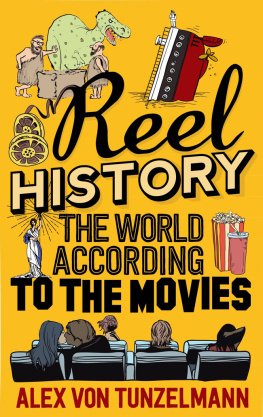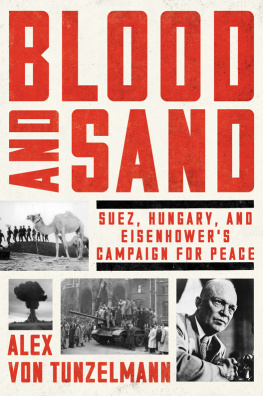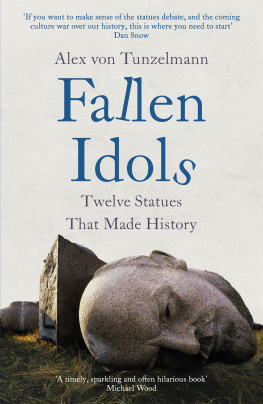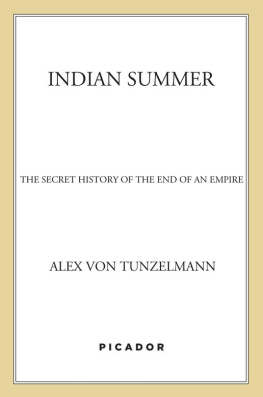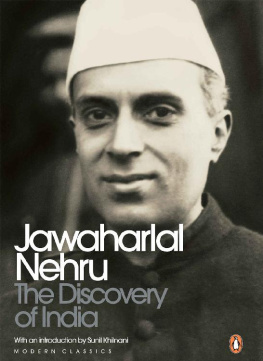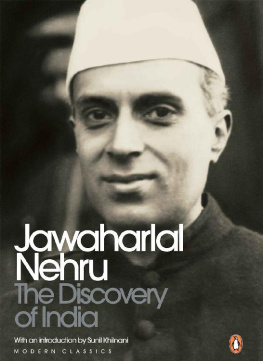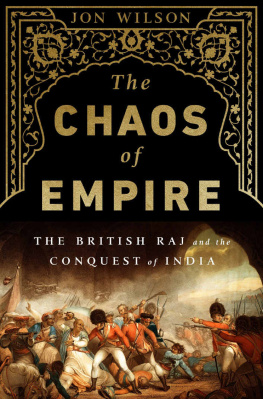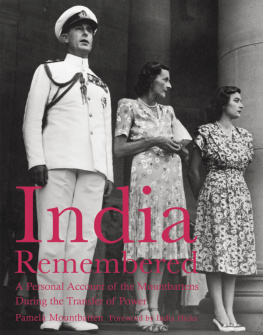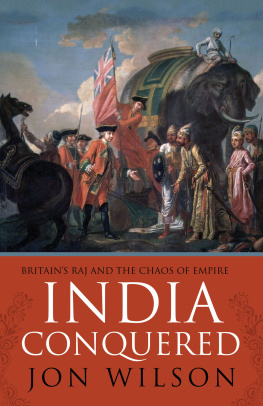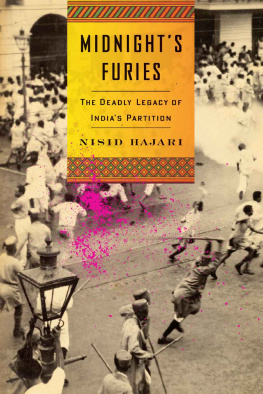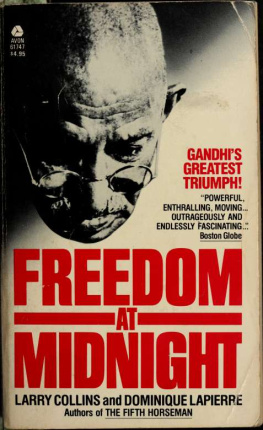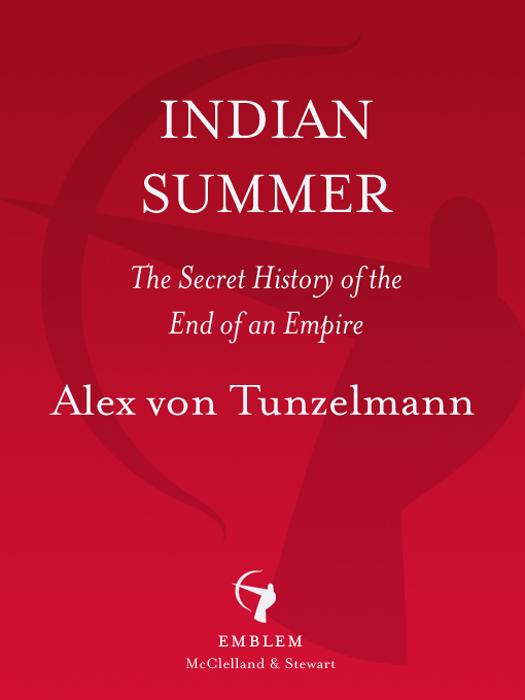ACCLAIM FOR
Indian Summer
An engaging, controversial, very lively and, at times, refreshingly irreverent tour de force. Alex von Tunzelmann has written a dramatic story, laced with tragedy and farce a remarkable debut.
Lawrence James, author of
Raj: The Making and Unmaking of British India
Alex von Tunzelmann is a wonderful historian, as learned as she is shrewd. But she is also something more unexpected: a writer with a wit and an eye for character that Evelyn Waugh would surely have admired.
Tom Holland, author of Rubicon and Persian Fire
Indian Summer is outstandingly vivid and authoritative. Alex von Tunzelmann brings a lively new voice to narrative history-writing.
Victoria Glendinning, author of Leonard Woolf
Alex von Tunzelmann has produced a superb account of an event that still has the power to shock; her lucid and even-handed narrative guides us safely through the excitements and complexities of the period.
Trevor Royle, author of The Last Days of the Raj
Copyright 2007 by Alex von Tunzelmann
Cloth edition published 2007
Emblem edition published 2008
Emblem is an imprint of McClelland & Stewart Ltd.
Emblem and colophon are registered trademarks of McClelland & Stewart Ltd.
First published in Great Britain in 2007
by Simon & Schuster U.K. Ltd.
All rights reserved. The use of any part of this publication reproduced, transmitted in any form or by any means, electronic, mechanical, photocopying, recording, or otherwise, or stored in a retrieval system, without the prior written consent of the publisher or, in case of photocopying or other reprographic copying, a licence from the Canadian Copyright Licensing Agency is an infringement of the copyright law.
Library and Archives Canada Cataloguing in Publication
Von Tunzelmann, Alex, 1977
Indian summer : the secret history of the end of an empire /
Alex von Tunzelmann.
eISBN: 978-1-55199-620-2
1. India History Partition, 1947. 2. India History Partition, 1947 Biography. 3. Statesmen India Biography. 4. British India History 20th century. 5. Great Britain Colonies Asia History 20th century. I. Title.
DS480.842.v66 2008 954.0359 C2008-900913-4
We acknowledge the financial support of the Government of Canada through the Book Publishing Industry Development Program and that of the Government of Ontario through the Ontario Media Development Corporations Ontario Book Initiative. We further acknowledge the support of the Canada Council for the Arts and the Ontario Arts Council for our publishing program.
McClelland & Stewart Ltd.
75 Sherbourne Street
Toronto, Ontario
M5A 2P9
www.mcclelland.com
v3.1
To Nick and Carol,
with love and thanks
CONTENTS
ACKNOWLEDGEMENTS
In Britain, I would like to thank Her Majesty The Queen for allowing me access to the Royal Archives at Windsor, and the staff there, especially Pamela Clark; the staff at the Mountbatten Papers at Southampton University, especially Karen Robson and Chris Woolgar; the National Archives at Kew; the department of Asian & African Studies at the British Library, London; the Newspaper Library at Colindale; the Churchill Archives Centre at Churchill College, Cambridge; the Centre of South Asian Studies at Cambridge; the Modern Papers Department at the Bodleian Library, Oxford, especially Colin Harris and Helen Langley; the School of Oriental and African Studies, London; and the London Library. In India, I would like to thank all the staff at the National Archives, and at the Nehru Memorial Museum & Library, both in New Delhi.
During the course of writing this book, I made repeated approaches to the Mountbatten and Nehru-Gandhi families, in the hope that I would be allowed to use the private archive of letters that passed between Jawaharlal Nehru and Edwina Mountbatten. Though their responses were courteous, neither family was keen to cooperate. Only a handful of carefully selected historians has ever been allowed to look at any part of this correspondence, a pity in view of the light it would undoubtedly shed on some of the twentieth centurys most fascinating personalities and politics. Lord Mountbatten himself is said to have wanted the correspondence published. At the time of writing, the letters remain closed.
Many people were generous in giving me their advice and thoughts. I would particularly like to thank M.J. Akbar, William Dalrymple, Saul David, Nicky Goldberg, Anna and James Hatt, Lawrence James, Julia Jordan, Edward Luce, Eleanor Newbigin, Dora Napolitano, Alexander van Praag, Nicole Taylor, Eugnie von Tunzelmann and Siraj Ulmulk. Special thanks must go to Nayantara Sahgal, for sharing with me her lucid and perceptive memories of the period and the people in this book and allowing me to see her wonderful collection of photographs and private letters. I would also like to thank Jeremy Paxman for giving me invaluable opportunities to hone my research skills, and for encouraging me to write my own book. Two friends in particular have offered indispensable help: Maddie Rowe, whose expert comments have been as witty as they have been perceptive; and Adi Bloom, whose exceptional readers eye and infectious enthusiasm for all things subcontinental have been inspiring.
The events of 194748 are still highly controversial, and some of those who spoke to me have asked not to be named. They may be assured of my gratitude nonetheless. Any errors in this book are entirely my responsibility.
For the production of this book, I would like to thank my editors, Andrew Gordon, George Hodgman and Chris Bucci; also Jennifer Barth, Kari Brownlie, Martin Bryant, Eva Diaz, Joanne Edgecombe, Lisa Fyfe, Sue Gard, Vicki Haire, Meryl Levavi, Vanessa Mobley, Emily Montjoy, Lindsay Ross, Kenn Russell, Rory Scarfe, John Sterling, and everyone at Simon & Schuster in London, Henry Holt in New York and McClelland & Stewart in Toronto. I am extremely grateful to Natasha Fairweather and to all at A.P. Watt, especially Philippa Donovan, Rob Kraitt, Naomi Leon and Linda Shaughnessy.
Finally, I would like to thank my parents for too many things to list here, but expressly for their unfailing support, wit, generosity, guidance and love throughout this project. It is a privilege to be able to dedicate this book to them.


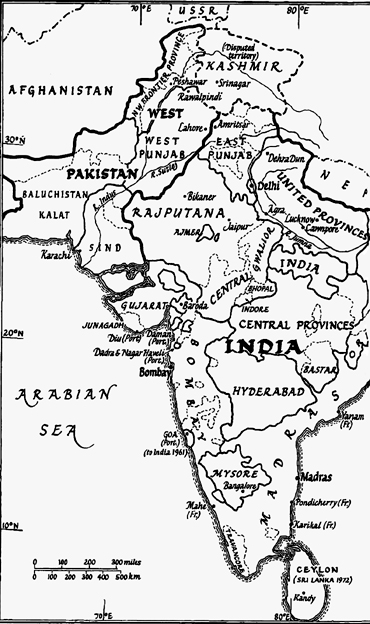
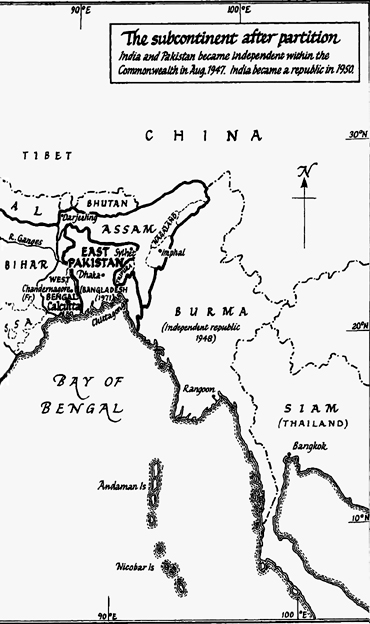
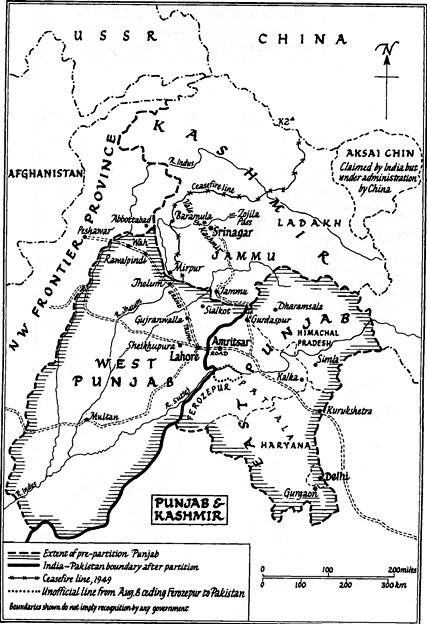
PROLOGUE
A T RYST WITH D ESTINY
O N A WARM SUMMER NIGHT IN 1947, THE LARGEST EMPIRE THE world has ever seen did something no empire had done before. It gave up. The British Empire did not decline, it simply fell; and it fell proudly and majestically on to its own sword. It was not forced out by revolution, nor defeated by a greater rival in battle. Its leaders did not tire or weaken. Its culture was strong and vibrant. Recently it had been victorious in the centurys definitive war.


